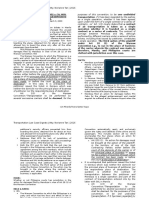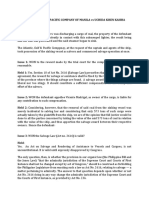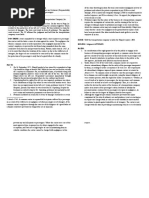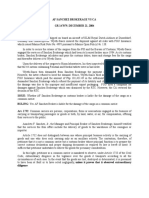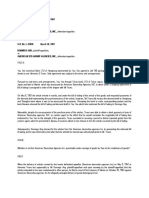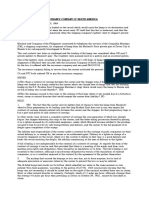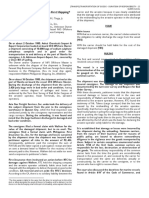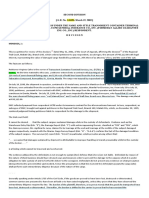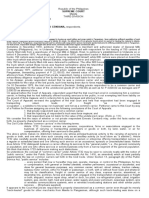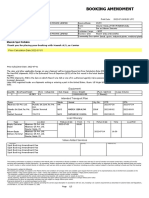0 ratings0% found this document useful (0 votes)
394 viewsYsmael vs. Barreto
Ysmael vs. Barreto
Uploaded by
jan ninoThis case considers whether a provision in a bill of lading that limits a carrier's liability to P300 per package is reasonable. The court held that it was not reasonable and that common carriers cannot exempt themselves from liability unless the exemption is just, reasonable, and the contract is entered into freely. In this case, the shipment of 164 cases of silk worth P2,500 each was a regular business transaction, but the liability limit would have allowed the carrier to pay only P300 per case, far below the actual value. Such a low liability limit is unconscionable and against public policy.
Copyright:
© All Rights Reserved
Available Formats
Download as DOCX, PDF, TXT or read online from Scribd
Ysmael vs. Barreto
Ysmael vs. Barreto
Uploaded by
jan nino0 ratings0% found this document useful (0 votes)
394 views1 pageThis case considers whether a provision in a bill of lading that limits a carrier's liability to P300 per package is reasonable. The court held that it was not reasonable and that common carriers cannot exempt themselves from liability unless the exemption is just, reasonable, and the contract is entered into freely. In this case, the shipment of 164 cases of silk worth P2,500 each was a regular business transaction, but the liability limit would have allowed the carrier to pay only P300 per case, far below the actual value. Such a low liability limit is unconscionable and against public policy.
Original Description:
dagul
Original Title
27. Ysmael vs. Barreto
Copyright
© © All Rights Reserved
Available Formats
DOCX, PDF, TXT or read online from Scribd
Share this document
Did you find this document useful?
Is this content inappropriate?
This case considers whether a provision in a bill of lading that limits a carrier's liability to P300 per package is reasonable. The court held that it was not reasonable and that common carriers cannot exempt themselves from liability unless the exemption is just, reasonable, and the contract is entered into freely. In this case, the shipment of 164 cases of silk worth P2,500 each was a regular business transaction, but the liability limit would have allowed the carrier to pay only P300 per case, far below the actual value. Such a low liability limit is unconscionable and against public policy.
Copyright:
© All Rights Reserved
Available Formats
Download as DOCX, PDF, TXT or read online from Scribd
Download as docx, pdf, or txt
0 ratings0% found this document useful (0 votes)
394 views1 pageYsmael vs. Barreto
Ysmael vs. Barreto
Uploaded by
jan ninoThis case considers whether a provision in a bill of lading that limits a carrier's liability to P300 per package is reasonable. The court held that it was not reasonable and that common carriers cannot exempt themselves from liability unless the exemption is just, reasonable, and the contract is entered into freely. In this case, the shipment of 164 cases of silk worth P2,500 each was a regular business transaction, but the liability limit would have allowed the carrier to pay only P300 per case, far below the actual value. Such a low liability limit is unconscionable and against public policy.
Copyright:
© All Rights Reserved
Available Formats
Download as DOCX, PDF, TXT or read online from Scribd
Download as docx, pdf, or txt
You are on page 1of 1
ISSUE:
Ysmael vs. BarrettoG.R. No. L-28028; Whether or not provision 12 in the bill of
November 25, 1927Keywor ! lading is reasonable.
Defendants (carrier) stipulate that it is not HELD:
liable for loss or damage to an amount
No. A common carrier cannot lawfully stipulate
exceeding P300 per package of silk
for exemption from liability unless such
DOCTRINE: exemption is just and reasonable and the
contract is freely and fairly made.
A common carrier cannot lawfully stipulate for
exemption from liability unless such exemption In The Case at Bar,
is just and reasonable and the contract is freely
The ship in question was a common carrier
and fairly made.
and as such, must have been operated as a
FACTS: public utility. It is a matter of common
knowledge that large quantities of silk are
In this action plaintiff, a domestic corporation
imported in the Philippine Islands and that
seeks to recover from the defendants P 9,940
after being imported; they are sold by the
the alleged value of four cases of merchandise
merchants in Manila and other large seaports,
which it delivered to the steamship Andres, at
and then shipped to different points and places
Manila to be shipped to Surigao, but which
in the Islands.
were never delivered to Salomon Sharuff, the
consignee, or returned to the plaintiff. Hence, there is nothing unusual about the
shipment of silk. In truth and in fact, it is
The defendants alleged that under provision 12
a matter of usual and ordinary business" –
of the bill of lading, the carrier shall not be
There was no fraud or concealment in the
liable for loss or damage from any cause or for
shipment in question. Clause 12 above quoted
any reason to an amount exceeding three
places a limit of P300 “for any single package
hundred pesos (P300) Philippine currency for
of silk." The evidence shows that 164 “cases”
any single package of silk or other valuable
were shipped, and that the value of each case
cargo. Thus, the defendants alleged that they
was never near P2, 500. In this situation, the
are not liable in excess of three hundred pesos
limit of defendants, “liability for each case of
(P300) for any package of silk.
silk” for loss or damage from any cause or for
The lower court points out that the conditions any reason” would put it in the power of the
(provision) in question “are not printed on the defendants to have taken the whole cargo of
triplicate copies which were delivered to the 164 cases of silk at a valuation of P300 for
plaintiff,” and that by reason thereof they “are each case, or less than one-eight of its actual
not binding upon the plaintiff” and thus value. If that rule of law should be sustained,
rendered judgment for the plaintiff for the full no silk should ever be shipped from one island
amount of its claim. to another in the Philippines, Such a limitation
of value is unconscionable and void as against
public policy.
You might also like
- Degrees of Diligence (Monograph)Document4 pagesDegrees of Diligence (Monograph)King Monteclaro Montereal100% (1)
- Veloso - Transpo Case - Aleson V CGUDocument3 pagesVeloso - Transpo Case - Aleson V CGURalph Niño Veloso100% (1)
- Confirmations 07.24.2023Document62 pagesConfirmations 07.24.2023severusrapeNo ratings yet
- Ganzon vs. Court of AppealsDocument2 pagesGanzon vs. Court of AppealsLemuel Angelo M. Eleccion100% (2)
- 61 - Smith Bell Vs BorjaDocument2 pages61 - Smith Bell Vs Borjacncrned_ctzen100% (2)
- 52 Isaac vs. A.L. Ammen Trans. Co.Document2 pages52 Isaac vs. A.L. Ammen Trans. Co.Choco MaphisonNo ratings yet
- Westwind Shipping Corporation VDocument2 pagesWestwind Shipping Corporation VTj Cabacungan100% (5)
- Ysmael V Barreto 51phil90Document3 pagesYsmael V Barreto 51phil90One Two100% (1)
- Philippine First Insurance v. Wallem First ShippingDocument2 pagesPhilippine First Insurance v. Wallem First ShippingMary Anne Guanzon Vitug100% (1)
- Philippine Shipping Company vs. VergaraDocument2 pagesPhilippine Shipping Company vs. Vergaraaudrey100% (1)
- TORTS-People v. PlazoDocument1 pageTORTS-People v. PlazoPatricia David-MolinaNo ratings yet
- Heirs of Amparo V CADocument2 pagesHeirs of Amparo V CAGenevieve Kristine Manalac100% (2)
- PAL v. Court of AppealsDocument1 pagePAL v. Court of AppealsHoven MacasinagNo ratings yet
- Dangwa Transportation V CADocument1 pageDangwa Transportation V CAGin Francisco100% (3)
- Arcoma y Moban v. CADocument2 pagesArcoma y Moban v. CAAr LineNo ratings yet
- Mapa V CADocument3 pagesMapa V CAGertrude ArquilloNo ratings yet
- FGU Ins Corp Vs GP Sarmiento Trucking Corp PDFDocument2 pagesFGU Ins Corp Vs GP Sarmiento Trucking Corp PDFG S100% (1)
- Nocum V Laguna Tayabas Bus Co PDocument7 pagesNocum V Laguna Tayabas Bus Co PValentine MoralesNo ratings yet
- Compilation of Transpo DigestsDocument5 pagesCompilation of Transpo DigestsFB100% (1)
- #7,11, 15 Spouses Perena Vs ZarateDocument3 pages#7,11, 15 Spouses Perena Vs ZarateTeacherEliNo ratings yet
- Santos Vs SibugDocument2 pagesSantos Vs SibugquasideliksNo ratings yet
- Benedicto Vs IacDocument2 pagesBenedicto Vs IacRaf Ruf100% (1)
- Heirs of Redentor Completo vs. Sgt. AlbaydaDocument2 pagesHeirs of Redentor Completo vs. Sgt. AlbaydaAlyssa joy TorioNo ratings yet
- American Airlines v. CA (Transpo)Document3 pagesAmerican Airlines v. CA (Transpo)Justine Camille RiveraNo ratings yet
- Gatchalian vs. DelimDocument3 pagesGatchalian vs. DelimMaya Julieta Catacutan-EstabilloNo ratings yet
- Ysmael V BarrettoDocument1 pageYsmael V Barrettoerwindm84No ratings yet
- TranspoDocument2 pagesTranspoCzarina AureNo ratings yet
- Roldan v. Lim Ponzo & Co., G.R. No. L-11325, (December 7, 1917), 37 PHIL 285-289Document2 pagesRoldan v. Lim Ponzo & Co., G.R. No. L-11325, (December 7, 1917), 37 PHIL 285-289Al Jay MejosNo ratings yet
- Yobido vs. CADocument1 pageYobido vs. CAGustavo Fernandez DalenNo ratings yet
- La Mallorca Vs de JesusDocument1 pageLa Mallorca Vs de JesusMaxi RaceNo ratings yet
- Inter Orient v. NLRCDocument1 pageInter Orient v. NLRCrgtan3No ratings yet
- PhilTranco Service Enterprises, Inc. v. Court of AppealsDocument2 pagesPhilTranco Service Enterprises, Inc. v. Court of AppealsNoreenesse SantosNo ratings yet
- Malayan Insurance V CADocument2 pagesMalayan Insurance V CAAgz Macalalad100% (1)
- Sweet Lines V CADocument2 pagesSweet Lines V CAiptrinidadNo ratings yet
- Perez v. Gutierrez, G.R No. L-30115, 28 September 1973Document2 pagesPerez v. Gutierrez, G.R No. L-30115, 28 September 1973ChescaNo ratings yet
- PNR V CADocument2 pagesPNR V CAJogie AradaNo ratings yet
- Torts - Case Digests - DanDocument4 pagesTorts - Case Digests - DanNad OdallimNo ratings yet
- Manila Doctors Vs OloresDocument1 pageManila Doctors Vs OloresLara CacalNo ratings yet
- 107 New Zealand Co. Ltd. V Choa Ty 97 Phil 646Document2 pages107 New Zealand Co. Ltd. V Choa Ty 97 Phil 646Cristina OlaritaNo ratings yet
- G.R. No. 244144 - Herma Shipping and Transport Corporation v. CorderoDocument3 pagesG.R. No. 244144 - Herma Shipping and Transport Corporation v. CorderoJay jogsNo ratings yet
- Western Shipping Agency Inc. v. NLRC (G.R. No. 109717)Document2 pagesWestern Shipping Agency Inc. v. NLRC (G.R. No. 109717)Matt Casis100% (1)
- National Steel Corp Vs CA (Digested)Document2 pagesNational Steel Corp Vs CA (Digested)Lyn Lyn Azarcon-Bolo100% (5)
- Pilapil v. CADocument2 pagesPilapil v. CAIris Gallardo100% (3)
- BATCH 1 Torts and Damages CASESDocument178 pagesBATCH 1 Torts and Damages CASESLei Del RosarioNo ratings yet
- Fortune Express, Inc. vs. CA 305 SCRA 14Document2 pagesFortune Express, Inc. vs. CA 305 SCRA 14Hortense VarelaNo ratings yet
- Litonjua Shipping Co. v. NSBDocument3 pagesLitonjua Shipping Co. v. NSBBeatrice AbanNo ratings yet
- Af Sanchez Brokerage Vs CA & Saludo, Jr. Vs CADocument2 pagesAf Sanchez Brokerage Vs CA & Saludo, Jr. Vs CAVanessa VelascoNo ratings yet
- Baliwag Transit Vs CADocument1 pageBaliwag Transit Vs CAphgmb0% (1)
- (g18) Litonjua Shipping Company Inc vs. National Seamen BoardDocument3 pages(g18) Litonjua Shipping Company Inc vs. National Seamen BoardMhaliNo ratings yet
- Ang v. American SteamshipDocument2 pagesAng v. American Steamshiperikha_aranetaNo ratings yet
- Far Eastern Shipping Vs CADocument2 pagesFar Eastern Shipping Vs CAAnonymous 5MiN6I78I0100% (1)
- HEIRS OF DE LOS SANTOS Vs CADocument3 pagesHEIRS OF DE LOS SANTOS Vs CAzebNo ratings yet
- 17 - Poblete vs. FabrosDocument2 pages17 - Poblete vs. FabrosMaggi BonoanNo ratings yet
- Southern Lines v. CADocument2 pagesSouthern Lines v. CAJustin Luis JalandoniNo ratings yet
- Dulay V CaDocument3 pagesDulay V CaDwight Anthony YuNo ratings yet
- Compania Maritima v. Insurance Company of North AmericaDocument2 pagesCompania Maritima v. Insurance Company of North AmericaRosanne SoliteNo ratings yet
- Roldan v. Lim Ponzo Co.Document1 pageRoldan v. Lim Ponzo Co.myschNo ratings yet
- Aboitiz Vs General FireDocument3 pagesAboitiz Vs General FireJD DXNo ratings yet
- Tiu V ArresgadoDocument3 pagesTiu V ArresgadoTrisha Ortega100% (1)
- Meralco Vs Castro-Bartolome (Self)Document8 pagesMeralco Vs Castro-Bartolome (Self)sjbloraNo ratings yet
- Rules On Validity of WillsDocument2 pagesRules On Validity of WillsManu SalaNo ratings yet
- Phil First Insurance vs. Wallem First ShippingDocument2 pagesPhil First Insurance vs. Wallem First ShippingGlenn Francis Gacal100% (1)
- 27 Ysmael Vs BarretoDocument1 page27 Ysmael Vs BarretoRaymund MacalindolNo ratings yet
- LRTA v. NatividadDocument7 pagesLRTA v. Natividadfjl_302711No ratings yet
- Calvo V Ucpb DigestDocument5 pagesCalvo V Ucpb Digestashnee09No ratings yet
- Gulf Air Company v. CIR, GR 182045, 19 September 2012Document7 pagesGulf Air Company v. CIR, GR 182045, 19 September 2012Rascille LaranasNo ratings yet
- Asia Lighterage Shipping Inc Vs CA and Prudential Guarantee and Assurance, IncDocument3 pagesAsia Lighterage Shipping Inc Vs CA and Prudential Guarantee and Assurance, Incdarwin polidoNo ratings yet
- Does Not Require A Franchise Before One Can Own The FacilitiesDocument7 pagesDoes Not Require A Franchise Before One Can Own The FacilitiesIshNo ratings yet
- Commercial Law - 2022 Ust Golden Notes - Confidential - (2) - 62-102Document41 pagesCommercial Law - 2022 Ust Golden Notes - Confidential - (2) - 62-102Owen DefuntaronNo ratings yet
- Pedro de Guzman vs. Court of AppealsDocument4 pagesPedro de Guzman vs. Court of AppealsKimberley Dela Cruz- MatammuNo ratings yet
- Whether PEPSI-COLA Exercised Due Diligence in The Selection of Its EmployeeDocument6 pagesWhether PEPSI-COLA Exercised Due Diligence in The Selection of Its EmployeeGela Bea BarriosNo ratings yet
- Part I Transpo NotesDocument27 pagesPart I Transpo NotesSALMAN JOHAYRNo ratings yet
- G.R. No. L-28673 Samar Mining V NordeutscherDocument11 pagesG.R. No. L-28673 Samar Mining V NordeutscherRogie ToriagaNo ratings yet
- Facturas La Rioja Octubre Folio 6 - 259 A 271Document6 pagesFacturas La Rioja Octubre Folio 6 - 259 A 271Marcos PatagonNo ratings yet
- Ad Valorem Bills of LadingDocument2 pagesAd Valorem Bills of LadingNikolay PetkovNo ratings yet
- Transportation Law Chapters 2 4 QAdocxDocument28 pagesTransportation Law Chapters 2 4 QAdocxDaryll Phoebe EbreoNo ratings yet
- Commercial Law - Transportation Sanchez Roman and Viada 2 Semester 2020Document24 pagesCommercial Law - Transportation Sanchez Roman and Viada 2 Semester 2020Chylsea CariagaNo ratings yet
- Torts and Damages 3rd Batch of CasesDocument74 pagesTorts and Damages 3rd Batch of CasesJayson AbabaNo ratings yet
- Group 2 TortsDocument24 pagesGroup 2 TortsEunice Kalaw VargasNo ratings yet
- Sample Indorsement With Legal OpinionDocument8 pagesSample Indorsement With Legal OpinionorlycaballarNo ratings yet
- BL Alaska Marine LinesDocument2 pagesBL Alaska Marine LinesmohanarwaaNo ratings yet
- (Digest) ST Paul V MacondrayDocument2 pages(Digest) ST Paul V MacondrayLiaa Aquino100% (1)
- Transpo TSN - First Exam Coverage 2016-2017 (Atty Valencia)Document22 pagesTranspo TSN - First Exam Coverage 2016-2017 (Atty Valencia)Lizette Kaye Estillore100% (1)
- 2 Calvo v. UCPB Insurance, 379 SCRA 510, G.R. No. 148496, March 19, 2002Document4 pages2 Calvo v. UCPB Insurance, 379 SCRA 510, G.R. No. 148496, March 19, 2002Aldin Limpao OsopNo ratings yet
- Vicente D. Millora For Petitioner. Jacinto Callanta For Private RespondentDocument27 pagesVicente D. Millora For Petitioner. Jacinto Callanta For Private RespondentMary Fatima BerongoyNo ratings yet
- BAcarro V CastanoDocument10 pagesBAcarro V CastanoRose Mary G. EnanoNo ratings yet
- Local Government TaxationDocument28 pagesLocal Government TaxationFunnyPearl Adal GajuneraNo ratings yet
- Booking Amendment: Maersk Spot RollableDocument2 pagesBooking Amendment: Maersk Spot RollablePrakash Singh Archi & Arnav SinghNo ratings yet
- Government of The Philippine Islands vs. Ynchausti & Co., 40 Phil. 219, No. 14191 September 29, 1919Document4 pagesGovernment of The Philippine Islands vs. Ynchausti & Co., 40 Phil. 219, No. 14191 September 29, 1919Sam WelbyNo ratings yet
- Sps. Perena Vs Sps. NicolasDocument3 pagesSps. Perena Vs Sps. NicolasInnah Agito-RamosNo ratings yet























